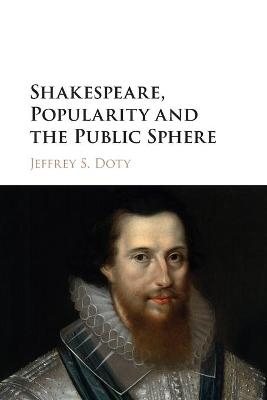
Shakespeare, Popularity and the Public Sphere
Seiten
2021
Cambridge University Press (Verlag)
978-1-316-61516-4 (ISBN)
Cambridge University Press (Verlag)
978-1-316-61516-4 (ISBN)
When Shakespeare emphasized the importance of winning popular opinion, he offered ordinary playgoers a new understanding of power: to succeed, politicians needed the assent of the people. This book argues that Shakespeare's dramatization of 'popularity' encouraged playgoers to understand public relations tactics and that it underlined their role in a critical public sphere.
In late Elizabethan England, political appeals to the people were considered dangerously democratic, even seditious: the commons were supposed to have neither political voice nor will. Yet such appeals happened so often that the regime coined the word 'popularity' to condemn the pursuit of popular favor. Jeffrey S. Doty argues that in plays from Richard II to Coriolanus, Shakespeare made the tactics of popularity - and the wider public they addressed - vital aspects of politics. Shakespeare figured the public not as an extension of the royal court, but rather as a separate entity that, like the Globe's spectators who surrounded the fictional princes on its thrust stage, subjected their rulers to relentless scrutiny. For ordinary playgoers, Shakespeare's plays offered good practice for understanding the means and ends of popularity - and they continue to provide insight to the public relations strategies that have come to define modern political culture.
In late Elizabethan England, political appeals to the people were considered dangerously democratic, even seditious: the commons were supposed to have neither political voice nor will. Yet such appeals happened so often that the regime coined the word 'popularity' to condemn the pursuit of popular favor. Jeffrey S. Doty argues that in plays from Richard II to Coriolanus, Shakespeare made the tactics of popularity - and the wider public they addressed - vital aspects of politics. Shakespeare figured the public not as an extension of the royal court, but rather as a separate entity that, like the Globe's spectators who surrounded the fictional princes on its thrust stage, subjected their rulers to relentless scrutiny. For ordinary playgoers, Shakespeare's plays offered good practice for understanding the means and ends of popularity - and they continue to provide insight to the public relations strategies that have come to define modern political culture.
Jeffrey S. Doty is an assistant professor of English at the University of North Texas.
1. Introduction; 2. Richard II and the early modern public sphere; 3. Henry IV, the theater, and the popular appetite; 4. Political interpretation in Julius Caesar; 5. Measure for Measure and the problem of popularity; 6. Coriolanus the popular man; Conclusion; Bibliography.
| Erscheinungsdatum | 23.03.2021 |
|---|---|
| Verlagsort | Cambridge |
| Sprache | englisch |
| Maße | 150 x 238 mm |
| Gewicht | 380 g |
| Themenwelt | Geisteswissenschaften ► Sprach- / Literaturwissenschaft ► Anglistik / Amerikanistik |
| Geisteswissenschaften ► Sprach- / Literaturwissenschaft ► Literaturgeschichte | |
| Geisteswissenschaften ► Sprach- / Literaturwissenschaft ► Literaturwissenschaft | |
| ISBN-10 | 1-316-61516-2 / 1316615162 |
| ISBN-13 | 978-1-316-61516-4 / 9781316615164 |
| Zustand | Neuware |
| Haben Sie eine Frage zum Produkt? |
Mehr entdecken
aus dem Bereich
aus dem Bereich
Poetik eines sozialen Urteils
Buch | Hardcover (2023)
De Gruyter (Verlag)
59,95 €
Entzauberung und Faszination des Immergleichen in Literatur und Film
Buch | Softcover (2024)
Springer Fachmedien Wiesbaden GmbH (Verlag)
84,99 €
Buch | Softcover (2024)
belleville (Verlag)
20,00 €


